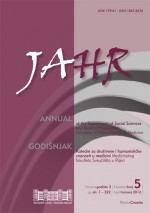Etičnost i profesionalizam smjesta
Keywords:
politizirano zdravstvo, tranzicijska (, posttranzicijska (Abstract
Continual education in the field of social sciences and medical humanities is nowadays a mandatory part of curricula at all medical schools in Republic of Croatia. The main aim of the aforementioned education is contained in the idea that the degree does not guarantee the future doctors to be only excellent experts, but also professionals with basic knowledge of ethics and possession of developed moral principles. Without them, doctors are not ready to perform their job and they lightly begin employing immoral and illegal procedures concern-ing their patients, which include disrespect for patient's autonomy and dignity, profit from pain and suffering of the sick and feeble, and finally, corruption.Such phenomena are, unfortunately, very common in politicized public health systems in transition countries, being an expression of more complex social changes, loss of values and institutional instabilities. Structural changes at society levels are thus visible both at the level of medical profession in general and the individual level, where ethics, one of the basic quali-ties of a health system, stagnates, deteriorates and often even perishes. Lack of ethics in doc-tors is most dangerous: an unethical doctor is at the same time an inhumane doctor, does not respect human values, moral and professional norms, and his behavior creates a specific type of transitional "ethics and professionalism". Such transitional ("old") ethics and ("old") professionalism are threats to patients' dignity and rights, reputation of the entire medical profession and in the long-term they endanger basics of medicine and health as systems of social stability and trust.Quality shift which would imply doctor's dedication to patient's well-being becomes possible only after "new" (post-transitional) ethics and professionalism have been implemented – im-mediately. However, the patient's well-being and doctor's reputation are only formal aims and goals if the implementation of ethics and professionalism is left to those structures whose only responsibilities are political and economic (in other words, reducing health costs). In this way the discrepancy between formal and real (culture of ) ethics and professionalism widens, and the achievement of basic health system aims in transition countries, including Croatia, is endangered.In conclusion, the development of post-transitional ("new") doctor's culture of ethics and professionalism must not be an accidental, occasional, unorganized attempt to reduce the already inflicted damage. Instead, it must be an interdisciplinary defined, quality-managed process with clearly defined structure, implementation methods, steps of realization and ex-pected results. Considering the necessity of creating the public health as a better place for both patients and doctors, as well as a stable social subsystem, the aforementioned process requires the engagement of participants at all social levels (doctors liberated from politics, patients engaged in decision-making and health-system control and politicians aware of the importance of the health system being efficient, but also humane.)
Downloads
Published
Issue
Section
License
Authors who publish with this journal agree to the following terms:
- Authors retain copyright and grant the journal right of first publication with the work simultaneously licensed under a Creative Commons Attribution License that allows others to share the work with an acknowledgement of the work's authorship and initial publication in this journal.
- Authors are able to enter into separate, additional contractual arrangements for the non-exclusive distribution of the journal's published version of the work (e.g., post it to an institutional repository or publish it in a book), with an acknowledgement of its initial publication in this journal.
- Authors are permitted and encouraged to post their work online (e.g., in institutional repositories or on their website) prior to and during the submission process, as it can lead to productive exchanges, as well as earlier and greater citation of published work (See The Effect of Open Access).



